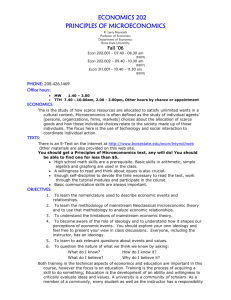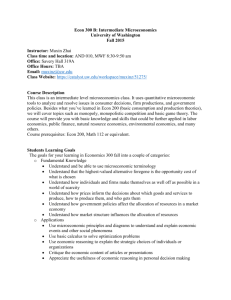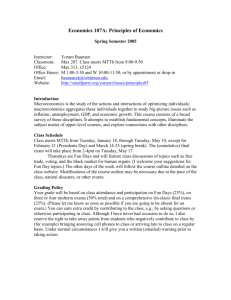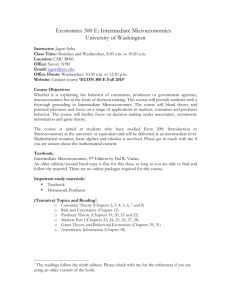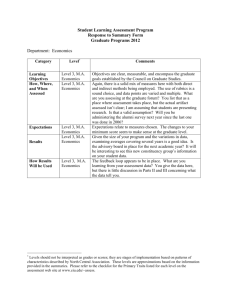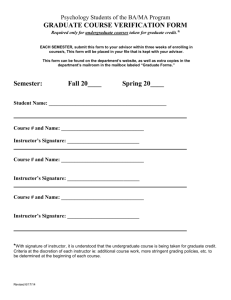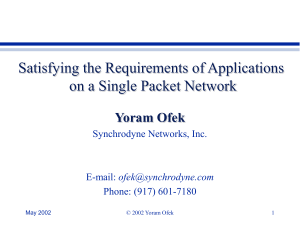Economics 200: Microeconomics
advertisement
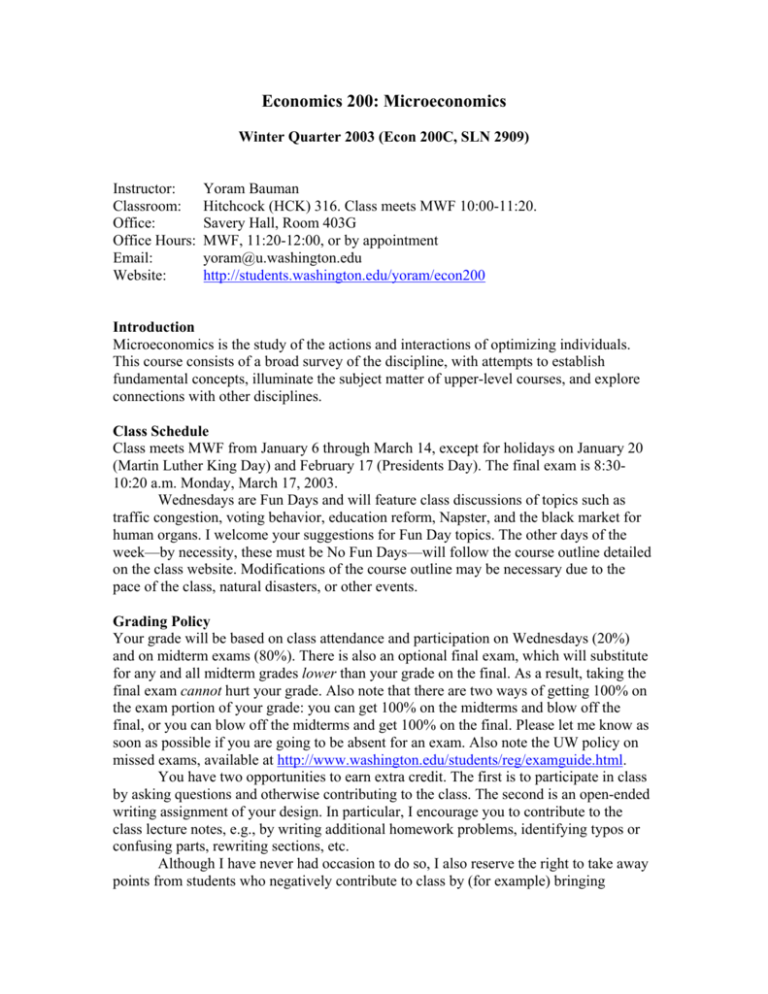
Economics 200: Microeconomics Winter Quarter 2003 (Econ 200C, SLN 2909) Instructor: Classroom: Office: Office Hours: Email: Website: Yoram Bauman Hitchcock (HCK) 316. Class meets MWF 10:00-11:20. Savery Hall, Room 403G MWF, 11:20-12:00, or by appointment yoram@u.washington.edu http://students.washington.edu/yoram/econ200 Introduction Microeconomics is the study of the actions and interactions of optimizing individuals. This course consists of a broad survey of the discipline, with attempts to establish fundamental concepts, illuminate the subject matter of upper-level courses, and explore connections with other disciplines. Class Schedule Class meets MWF from January 6 through March 14, except for holidays on January 20 (Martin Luther King Day) and February 17 (Presidents Day). The final exam is 8:3010:20 a.m. Monday, March 17, 2003. Wednesdays are Fun Days and will feature class discussions of topics such as traffic congestion, voting behavior, education reform, Napster, and the black market for human organs. I welcome your suggestions for Fun Day topics. The other days of the week—by necessity, these must be No Fun Days—will follow the course outline detailed on the class website. Modifications of the course outline may be necessary due to the pace of the class, natural disasters, or other events. Grading Policy Your grade will be based on class attendance and participation on Wednesdays (20%) and on midterm exams (80%). There is also an optional final exam, which will substitute for any and all midterm grades lower than your grade on the final. As a result, taking the final exam cannot hurt your grade. Also note that there are two ways of getting 100% on the exam portion of your grade: you can get 100% on the midterms and blow off the final, or you can blow off the midterms and get 100% on the final. Please let me know as soon as possible if you are going to be absent for an exam. Also note the UW policy on missed exams, available at http://www.washington.edu/students/reg/examguide.html. You have two opportunities to earn extra credit. The first is to participate in class by asking questions and otherwise contributing to the class. The second is an open-ended writing assignment of your design. In particular, I encourage you to contribute to the class lecture notes, e.g., by writing additional homework problems, identifying typos or confusing parts, rewriting sections, etc. Although I have never had occasion to do so, I also reserve the right to take away points from students who negatively contribute to class by (for example) bringing annoying cell phones to class or arriving late to class on a regular basis. Under normal circumstances I will give you a written (emailed) warning prior to taking action. Class Philosophy The immediate goals for this class are (1) to help introduce you to a new way of looking at the world, to what Paul Heyne called the economic way of thinking; (2) to apply this new way of looking at the world by discussing current events; and (3) to have fun. The ultimate goal is for all of us to become more well-rounded and thoughtful members of society. As such, I will measure (and encourage you to measure) the success of the class by its long-term impact, i.e., by its effect on your thinking and behavior after the last day of class. One manifestation of this goal is that I will de-emphasize short-term achievements: I will not ask you to engage in pointless memorization or force you to cram for a final exam. A second manifestation is that I will try hard to make the learning process as painless as possible: if you find the economic way of thinking difficult or cumbersome you are unlikely to make much use of it after class is over. Textbook/Printed Materials The required text for this class is Silberberg’s Principles of Economics, 3rd edition. (The 2nd edition is fine too.) The accompanying study guide is optional. We will also make use of a reading packet that you can pick up for about $30 at Ave Copy Center (green awning on the west side of the Ave, just south of 42nd St.). The Ave Copy Center also sells (for $15 or so) my class lecture notes, which are being organized into a book titled Quantum Microeconomics. You can also download this document for free from the class website for viewing and/or printing. One advantage of online viewing is that the hypertext links are clickable. Mathematical Requirements I will try to avoid an overly mathematical presentation of the material, but graphs, formulas, percentages, numerical examples, basic algebra, &etc will be important elements of the class. The point of the mathematics is to clarify rather than muddy the economics, so please let me know me if you are having mathematical difficulties. Intermediate microeconomics (Econ 300) is a calculus-based approach to the same material covered in Econ 200. If you are planning on continuing in economics—or if you have a mathematical bend—you might want to check them out my Econ 300 lecture notes and other materials at http://students.washington.edu/yoram/econ300.) As always, I welcome your comments and suggestions. Communication I regularly send out emails to the class list provided to me by the University. I also post PDF files on the class website; you should be able to view and print them from any computer on- or off-campus. If you experience technical difficulties, you can try asking me, but I am not a computer expert. The folks at the UWired computer labs are. Other Electronic Information Thanks to the UW Catalyst software system, there is now a discussion forum for our class (http://catalyst.washington.edu/webtools/epost/register.cgi?owner=yoram&id=3780). Participation in this discussion forum will count toward your Wednesday grade. There is also a form (http://catalyst.washington.edu/webtools/umail/mail.cgi?user=yoram&form=1) for providing me with anonymous feedback about the class. Please keep in mind that this is an anonymous feedback form; if you have a question, please send me a regular email! Disabilities If you would like to request academic accommodations due to a disability, please contact Disabled Student Services, 448 Schmitz, 206-543-8924 (V/TTY). If you have a letter from Disabled Student Services indicating you have a disability that requires academic accommodations, please present the letter to me so we can discuss the accommodations you might need for this class. A Final Caveat: Sleep but Don’t Snore The laissez-faire ideology is central to this class. I will assume that you are doing what is best for you, and I will not question or attempt to have undue influence on your choices. I will try hard to tell you what to expect on tests, and you will be free to learn as you choose: learn from class, learn from your friends, learn from a book, learn from the lecture, learn from the web, learn from the (optional) homework assignments—whatever works for you. The only caveat is that you should not detract from the learning experience of other students. PS. Special Information Regarding Graduate Student Instruction Graduate School Memorandum #14 suggests the inclusion of the following information regarding your graduate student instructor (i.e., me): If you have any concerns about the course or your instructor, please see the instructor about these concerns as soon as possible. If you are not comfortable talking with the instructor or not satisfied with the response that you receive, you may contact Phil Brock in Savery M230 or at plbrock@u.washington.edu. (Professor Brock is the graduate program advisor in the economics department.) If you are still not satisfied with the response that you receive, you may contact department chair Neil Bruce in Savery 228 or at brucen@u.washington.edu. You may also contact the Graduate School at G-1 Communications Bldg, by phone at (206) 5435900, or by e-mail at efeetham@u.washington.edu.
